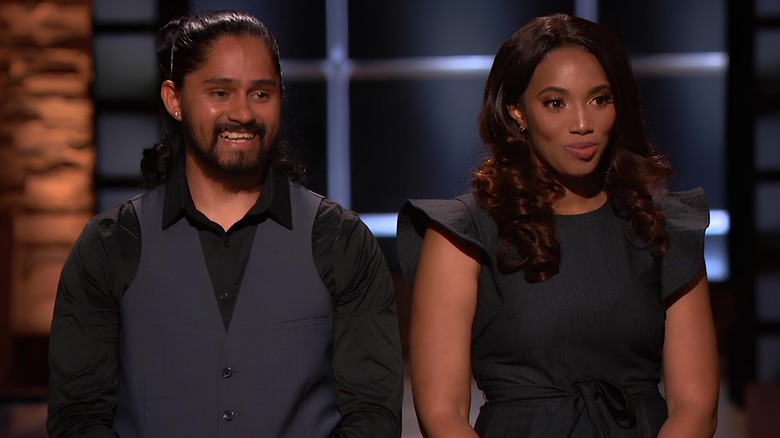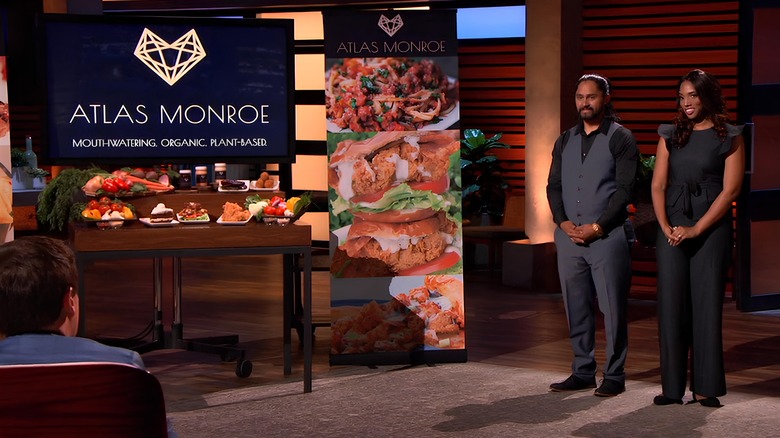Whatever Happened To Atlas Monroe After Shark Tank?
A number of entrepreneurs have entered the "Shark Tank" studio in the hopes of making a deal for their vegan products, with Pan's Mushroom Jerky being successful in that regard, among other companies. However, each entrepreneur has their own unique backstory when it comes to plant-based foods. For Atlas Monroe CEO Deborah Torres, the road to vegan cookery began in 2015 when her father was diagnosed with type 2 diabetes. In a show of support, her entire family switched to a raw, vegan, and organic diet for 90 days.
"We grew really hangry at each other from just eating salads and fruit salads," Torres recalled on "Shark Tank." She began experimenting in the kitchen, cooking up plant-based, organic versions of bone-sticking classics like lasagna and fried chicken. Remarkably, the dietary changes reversed her father's diagnosis.
Torres decided to bring her healing foodstuffs to the masses and launched her vegan chicken catering company, Atlas Monroe, in 2017. That year, she was invited to participate in the Vegandale Chicago food festival, and the wheat-based "chick'n" was a hit. "The day of the festival, our line was longer than a football field," she told LIVEKINDLY. "The owners had posted a photo from our website and by the end of the day, the whole festival — the DJs, the artists — were coming to our booth saying, 'Everybody's talking about this chick'n, we gotta try it!'"
After building up her company by word of mouth and on social media, Torres brought Atlas Monroe to Season 11 of "Shark Tank" in 2019.
Atlas Monroe didn't incite a feeding frenzy on Shark Tank
When Deborah and Jonathan Torres serve their vegan chicken to the panel of Sharks on "Shark Tank," the Sharks are unable to discern that the "chicken" isn't chicken at all. They are further impressed by some of Atlas Monroe's accolades. For example, it is the only vegan company to have been invited to the 2018 National Fried Chicken Festival.
The company's numbers are less enticing. Torres says that in 2019, Atlas Monroe made $63,000 in sales with a net of $73,000 and a gross of $76,000. The Sharks are confused by the seemingly impossible numbers, and Torres attempts to explain that the shipping costs account for the additional revenue. Moreover, they think Torres' valuation of $500,000 for a 10% stake in the company is excessive.
Mark Cuban is the only Shark who attempts to salvage a deal, offering $500,000 for 30% of Atlas Monroe. After discussing a different course of action with guest Shark Rohan Oza, the pair teams up for a new offer to buy out the company for $1 million, with 10% of the profits going to the Torres family in perpetuity.
The other Sharks encourage the entrepreneurs to make the deal — an unprecedented one in "Shark Tank" history — but they turn it down.
Deborah Torres walked away from $1 million and has no regrets
Immediately after the Atlas Monroe episode aired, the "Shark Tank" effect went into full gear, and the company sold out its inventory in two hours and netted $350,000. The post-"Shark Tank" glow wasn't a fluke, either. In 2020, Atlas Monroe made more than $1 million.
For Deborah Torres, the results were gratifying, if not unsurprising; even before the Sharks made their million-dollar bid, she knew she had something special. "The fact you guys are even offering a million dollars lets me know you do understand what we are worth," she tells the Sharks in the episode.
Torres felt she was misrepresented on "Shark Tank" and was made to look unprepared and incompetent. "On 'Shark Tank,' there were many edits of conversations to make it appear that I wasn't intelligent enough for obvious dramatic effects of the 'shocking' ending," she told VegNews. "[Being] made to look like an idiot on national television... was crushing, to say the least."
Still, it was important for Torres to retain full ownership of Atlas Monroe and, at the same time, recognize her own worth. "I would be devastated to see my company go on to make millions and myself and my people profiting very little from it after working so hard," Torres told AfroTech.
Production is way up thanks to a new manufacturing plant
With Atlas Monroe's continued success after "Shark Tank," Deborah Torres was able to expand the company's operations. In 2021, Atlas Monroe acquired a 10,000-square-foot manufacturing facility in San Diego. While the company was previously able to process 1,000 pieces of vegan chicken a week, the multi-million dollar space bumped that number up to over 20,000.
The menu at Atlas Monroe has expanded as well. In addition to its flagship fried chick'n, Atlas Monroe manufactures rice-based vegan bacon, applewood smoked ribs, jerk and Korean BBQ pork, ground beef, and a variety of signature sauces, as well as vegan sweets like cookies and cakes. Atlas Monroe ships its products nationwide, and they're also available for pick-up in San Diego. Moreover, restaurants in California, Florida, Ohio, Virginia, and South Carolina sell Atlas Monroe-produced foods.
In her "Shark Tank" appearance, Torres teased a forthcoming deal with the Canadian vegan restaurant chain Copper Branch. That deal came to fruition, and now the restaurant has Atlas Monroe products in over 40 locations in Canada, the United States, and Australia.
What's next for Atlas Monroe?
Deborah Torres has become an advocate for self-sufficiency in her industry, speaking at events like WBUR's Phenomenal Women series and the 2023 Vegan Women Summit. At the latter, she shared her "Shark Tank" experience and how it didn't deter her from growing her business. "When you do go in front of a venture capitalist or investors, if they turn you down or tell you, 'You're not worth this'... Just know, 'I got this.' Stay focused," she said (via Instagram). "If you get turned down, keep going, because I am living proof of that." When it comes to her business, Torres is still dreaming big. She wants to take Atlas Monroe public, and the company's website claims that it is working to open a restaurant.
For all of her lofty aspirations, Torres is still committed to sharing the health benefits of plant-based foods, and that those options are available for all consumers. "I think that the biggest disparity is that vegan products are not available in certain spaces," she said in the same interview with LIVEKINDLY. "And it's really weird considering that communities of color are the largest growing vegan group."
She also wants to inspire other women-owned and POC-owned businesses. "I want to see people who look like me win," Torres continued. "I want to see women and children across the spectrum win. And if they need help with that, I want to be that person to help them."




